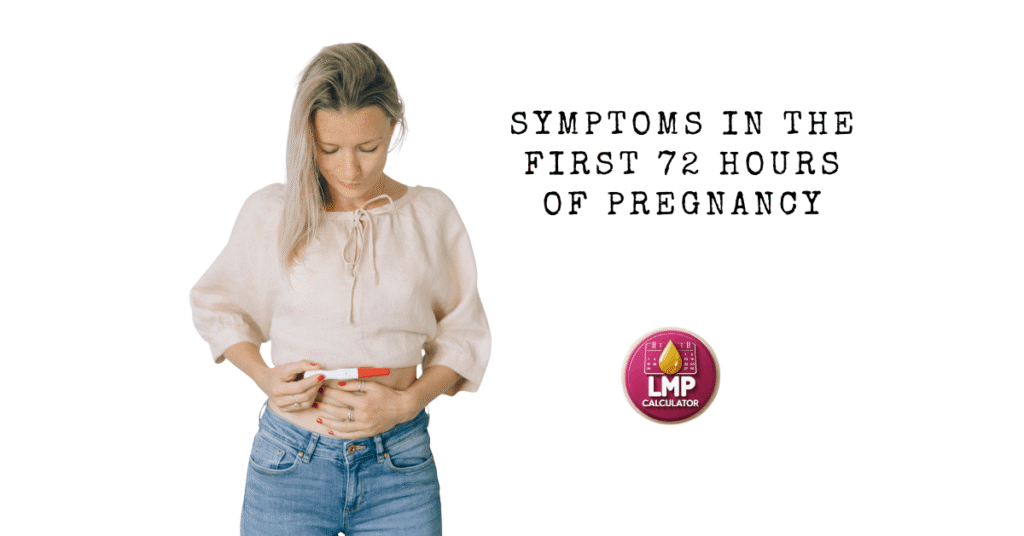Author & Reviewer Dr. Anuja Dokras, MBBS, DNB (Obs & Gynae)
Oxford-trained specialist in Infertility & Women’s Health.
Founder of LMP Calculator.
“Many women are eager to know what the very first sign of conception is. They want to know what it feels like immediately after fertilization. In this article, we will use science to understand what is really happening inside your body during the first 72 hours and what the truth is about symptoms.”
Introduction: Can You Feel Symptoms Within 3 Days of Conception?
This is a very common question, and the direct, scientific answer is: No, you cannot feel any real pregnancy symptoms within the first 72 hours of conception.
This might be disappointing to hear, but there is a clear biological reason for it. In this guide, we will explore what happens inside your body during these first 72 hours, what might be causing the sensations you’re feeling, and when actual pregnancy symptoms truly begin.
Part 1: The Scientific Truth of the First 72 Hours
The process of conception doesn’t happen in a single moment but over several stages. Let’s look at what occurs in the first 3 days:
- Hour 0: Fertilization: A sperm successfully meets an egg in your fallopian tube. At this moment, a single cell with a unique genetic code, called a ‘zygote,’ is formed.
- Hours 12-24: Cell Division: Approximately 24 hours after fertilization, this single cell divides into two cells.
- Hours 24-72: Travel and Continuous Division: For the next few days, this group of cells (now called a ‘morula’) continues to divide while it slowly travels down the fallopian tube toward the uterus.
The most crucial point: During these first 72 hours, the growing embryo is not physically connected to your body. It is not sharing any hormones with your bloodstream. Therefore, your body does not yet “know” that you are pregnant, and it cannot produce any pregnancy-specific symptoms.
Part 2: So, Why Am I Feeling These “Symptoms”? (The Real Reason)
If you are actively trying to conceive, you might be hyper-aware of your body and feel something like mild cramping, fatigue, or breast soreness. These feelings are real, but they are not caused by pregnancy. The actual culprit is: Progesterone.
- What is Progesterone: After ovulation (the release of an egg from the ovary), your body produces a hormone called progesterone. The job of this hormone is to prepare the uterine lining for a potential pregnancy by making it thick and nourishing.
- The Effects of Progesterone: High levels of progesterone cause many of the same symptoms that we often confuse with very early signs of pregnancy, such as:
- Mild breast pain or tenderness
- Fatigue and sleepiness
- Bloating
- Mood swings
- Mild cramping
Expert Opinion – Dr. Anuja Dokras: “It’s important to understand that progesterone levels rise every month after ovulation, whether you are pregnant or not. Therefore, the symptoms you might feel immediately after fertilization are actually a part of your normal menstrual cycle, not a new sign of pregnancy.”

Part 3: When Do Real Pregnancy Symptoms Actually Start?
True pregnancy symptoms begin only after the embryo successfully implants in the uterus.
- Implantation: This process occurs 6 to 12 days after fertilization. At this point, the embryo attaches to the uterine wall and makes contact with the mother’s bloodstream.
- Production of the hCG Hormone: Only after implantation does the body start producing the ‘pregnancy hormone’ known as hCG (Human Chorionic Gonadotropin). This is the hormone detected in pregnancy tests and the primary cause of early pregnancy symptoms (like nausea and frequent urination).
Therefore, the earliest symptoms you might feel will appear around the time of implantation or shortly after, not within the first 72 hours.
Conclusion: Patience and Accurate Information are Key
Dr. Anuja Dokras’s Final Message:“It is natural to be curious about every stage of the pregnancy journey, especially the very beginning. However, expecting to feel symptoms in the first 72 hours is not scientifically sound. At this time, the best thing you can do is be patient, maintain a healthy lifestyle, and let your body do its work. The time for real signs to appear will come after implantation. Until then, stay stress-free and take care of yourself.”
Disclaimer: This article is for general informational purposes only and should not be considered a substitute for professional medical advice. Always consult your doctor or another qualified health provider with any health concerns.
